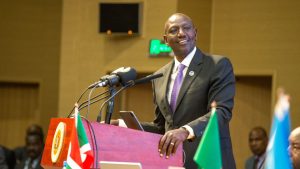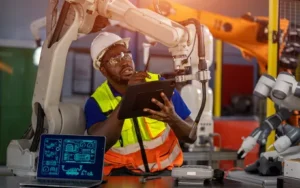How Huawei Seeds for the Future programme Shaped Kenyan Sylvia Jebet’s Career

In 2020 at the height of the COVID-19 pandemic, Sylvia Jebet Kipkemoi, a graduate of BSc. Telecommunication & Information Engineering from Jomo Kenyatta University of Agriculture and Technology (JKUAT), was stuck in the village after all learning institutions were closed following the lockdown that resulted from the pandemic.
A third year at the time, Sylvia retreated to the village to take up some farm work, as the uncertainties presented by the pandemic unfolded. At the university, she was a member of an engineering club where she was in-charge of the club’s publicity.
“We relied a lot on keeping in touch through printed stuffs like fliers while in college, which was now restricted by the pandemic so I began scouting for other means of communication during the lock-down. We then decided to form a WhatsApp group. It’s through this group that one of the members shared a link on Huawei Seeds for the Future programme,” she said.
Intrigued by the prospect of advanced training and international exposure, Sylvia eagerly applied. The rigorous selection process tested her technical knowledge, problem-solving skills, and passion for technology. She then went through an interview process and was lucky to be one of the students picked for the programme in 2020.
“I applied, even though I was skeptical since I was competing against senior students, some of whom were in their final (fifth) year. Being chosen as a participant felt like a significant milestone in my academic and career journey,” she quipped.
Because of the pandemic, those shortlisted went through a virtual programme – from trainings to assessments to graduation. They studied and tackled projects, virtually, including a virtual tour of Huawei University.
Transformative experience
The Seeds for the Future programme offers in-depth training on emerging technologies such as 5G, cloud computing, and artificial intelligence. These sessions are conducted by industry experts and provide hands-on practice, which significantly enhanced students’ technical skills and understanding of these cutting-edge technologies.
The programme also offers students an opportunity to engage in global learning tour and cultural exchange, physically, at the Huawei’s Headquarters in China.
This year, Sylvia together with three other students from Kenya got the opportunity to participate in a one-week immersion into digital technology skills during the MWC Shanghai 2024 in China.
“The Huawei Seeds for the Future programme was a transformative experience, packed with learning and growth opportunities. Visiting Huawei’s headquarters in China was an eye-opener. I witnessed the latest innovations and interacted with professionals who are at the forefront of technological advancements. This exposure has given me valuable insights into the global ICT landscape and the practical applications of the technologies I was learning about,” She said.
“One of the unique aspects of the programme was the cultural immersion activities. Learning about Chinese culture, history, and language broadened my perspective and taught me the importance of cross-cultural communication in today’s globalized world. This experience has made me more adaptable and open-minded.”
To Sylvia, the Seeds for the Future programme is not just about technical knowledge; it also emphasizes the development of soft skills. Through various team projects and interactions, she has scaled up her leadership, teamwork, and communication skills, which she says, has made her more confident in her abilities.
“Through this programme, I haverealized the immense potential of ICT in driving innovation and solving real-world problems. I am grateful to Huawei for the opportunity and am committed to using what I have learned to drive technological innovation and make a positive impact and improve lives in my community and beyond,” she said.
She now works as Developer Relations Associate, at Africa’s Talking, a telecommunication company that offers a unified API platform for software developers in Africa to build applications using SMS, USSD, voice and airtime.






